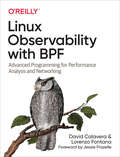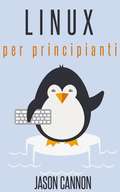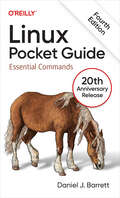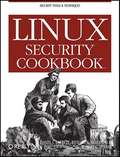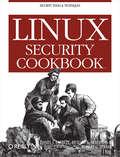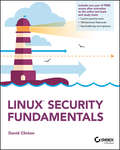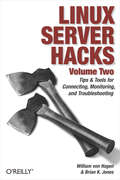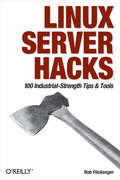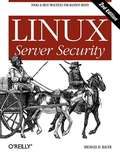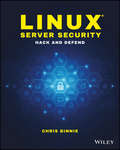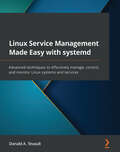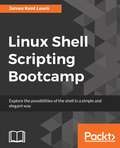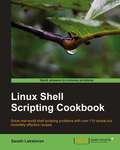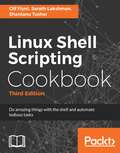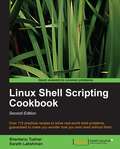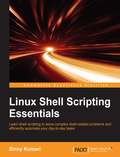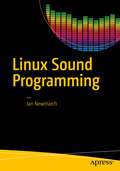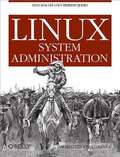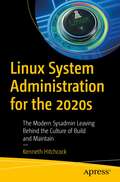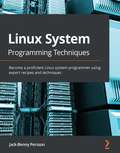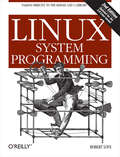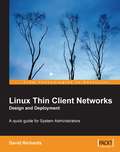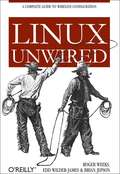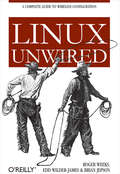- Table View
- List View
Linux Observability with BPF: Advanced Programming for Performance Analysis and Networking
by David Calavera Lorenzo FontanaBuild your expertise in the BPF virtual machine in the Linux kernel with this practical guide for systems engineers. You’ll not only dive into the BPF program lifecycle but also learn to write applications that observe and modify the kernel’s behavior; inject code to monitor, trace, and securely observe events in the kernel; and more.Authors David Calavera and Lorenzo Fontana help you harness the power of BPF to make any computing system more observable. Familiarize yourself with the essential concepts you’ll use on a day-to-day basis and augment your knowledge about performance optimization, networking, and security. Then see how it all comes together with code examples in C, Go, and Python.Write applications that use BPF to observe and modify the Linux kernel’s behavior on demandInject code to monitor, trace, and observe events in the kernel in a secure way—no need to recompile the kernel or reboot the systemExplore code examples in C, Go, and PythonGain a more thorough understanding of the BPF program lifecycle
Linux Per Principianti
by Eugenia Franzoni Jason CannonSe volete imparare ad usare Linux ma non sapete dove iniziare, continuate a leggere.Sapere dove iniziare quando si impara qualcosa di nuovo può essere un problem,a soprattutto se l'argomento sembra così vasto. Ci possono essere così tante informazioni a disposizione che non si riesce nemmeno a decidere da dove iniziare, o peggio, si comincia ad imparare e si scoprono velocemente così tanti concetti, esempi di programmazione e dettagli che non vengono spiegati. Questo tipo di esperienza è frustrante e lascia con più domande che risposte.Linux per principianti non dà per scontato niente su quello che già conoscete di Linux. Non serve sapere niente per trarre beneficio da questo libro. Verrete guidati passo dopo passo usando un approccio logico e sistematico. A mano a mano che incontrerete nuovi concetti, codice e termini, questi verranno spiegati in linguaggio chiaro, rendendo semplice comprenderli per chiunque.Ecco cosa imparerete leggendo Linux per principianti:Come accedere ad un server Linux se non ne avete uno.Cosa è una distribuzione di Linux e come sceglierne una.Quale software serve per connettersi a Linux da computer Mac e Windows, con gli screenshot.Cosa è SSH e come usarla, compresa la creazione di chiavi SSH.La struttura del filesystem di Linux e dove trovare i programmi, i file di configurazione e la documentazione.I comandi Linux di base che userete più spesso.Creare, rinominare, spostare e cancellare le directory.Elencare, leggere, creare, modificare, copiare e cancellare i file.Come funzionano esattamente i permessi e come decifrare quelli più strani con facilità.Come usare gli editor nano, vi ed emacs.Due metodi per cercare file e directory.Come paragonare il contenuto dei file.Cosa sono le pipe, perché sono utili e come usarle.Come comprimere i file per risparmiare spazio e trasferirli facilmente.Come e perché redirigere l'input e l'output delle applicazioni.Come person
Linux Pocket Guide
by Daniel J. BarrettIf you use Linux in your day-to-day work, this popular pocket guide is the perfect on-the-job reference. The second edition has expanded from Fedora-only coverage to distro-neutral, with practical information on a wider range of commands requested by readers. Linux Pocket Guide provides an organized learning path for Linux use, rather than Linux programming and system administration. You'll find options for the most useful commands, grouped by functionality. For novices who need to get up to speed on Linux use, and experienced users who want a concise and functional reference, this guide provides quick answers.
Linux Pocket Guide: Essential Commands
by Daniel J. BarrettIf you use Linux in your day-to-day work, then Linux Pocket Guide is the perfect on-the-job reference. This thoroughly updated 20th anniversary edition explains more than 200 Linux commands, including new commands for file handling, package management, version control, file format conversions, and more.In this concise guide, author Daniel Barrett provides the most useful Linux commands grouped by functionality. Whether you're a novice or an experienced user, this practical book is an ideal reference for the most important Linux commands.You'll learn:Essential concepts—commands, shells, users, and the filesystemFile commands-creating, organizing, manipulating, and processing files of all kindsSysadmin basics-superusers, processes, user management, and software installationFilesystem maintenance-disks, RAID, logical volumes, backups, and moreNetworking commands-working with hosts, network connections, email, and the webGetting stuff done-everything from math to version control to graphics and audio
Linux Security Cookbook
by Daniel J. Barrett Robert G. Byrnes Richard SilvermanThe Linux Security Cookbook includes real solutions to a wide range of targeted problems, such as sending encrypted email within Emacs, restricting access to network services at particular times of day, firewalling a webserver, preventing IP spoofing, setting up key-based SSH authentication, and much more. With over 150 ready-to-use scripts and configuration files, this unique book helps administrators secure their systems without having to look up specific syntax.
Linux Security Cookbook: Security Tools & Techniques
by Daniel J. Barrett Robert G. Byrnes Richard E. SilvermanComputer security is an ongoing process, a relentless contest between system administrators and intruders. A good administrator needs to stay one step ahead of any adversaries, which often involves a continuing process of education. If you're grounded in the basics of security, however, you won't necessarily want a complete treatise on the subject each time you pick up a book. Sometimes you want to get straight to the point. That's exactly what the new Linux Security Cookbook does. Rather than provide a total security solution for Linux computers, the authors present a series of easy-to-follow recipes--short, focused pieces of code that administrators can use to improve security and perform common tasks securely.The Linux Security Cookbook includes real solutions to a wide range of targeted problems, such as sending encrypted email within Emacs, restricting access to network services at particular times of day, firewalling a webserver, preventing IP spoofing, setting up key-based SSH authentication, and much more. With over 150 ready-to-use scripts and configuration files, this unique book helps administrators secure their systems without having to look up specific syntax. The book begins with recipes devised to establish a secure system, then moves on to secure day-to-day practices, and concludes with techniques to help your system stay secure.Some of the "recipes" you'll find in this book are:Controlling access to your system from firewalls down to individual services, using iptables, ipchains, xinetd, inetd, and moreMonitoring your network with tcpdump, dsniff, netstat, and other toolsProtecting network connections with Secure Shell (SSH) and stunnelSafeguarding email sessions with Secure Sockets Layer (SSL)Encrypting files and email messages with GnuPGProbing your own security with password crackers, nmap, and handy scriptsThis cookbook's proven techniques are derived from hard-won experience. Whether you're responsible for security on a home Linux system or for a large corporation, or somewhere in between, you'll find valuable, to-the-point, practical recipes for dealing with everyday security issues. This book is a system saver.
Linux Security Fundamentals
by David ClintonIncludes one year of FREE access after activation to the online test bank and study tools: Custom practice exam 100 electronic flashcards Searchable key term glossary The Sybex™ method for teaching Linux® security concepts Understanding Linux Security is essential for administration professionals. Linux Security Fundamentals covers all the IT security basics to help active and aspiring admins respond successfully to the modern threat landscape. You'll improve your ability to combat major security threats against computer systems, networks, and services. You'll discover how to prevent and mitigate attacks against personal devices and how to encrypt secure data transfers through networks, storage devices, or the cloud. Linux Security Fundamentals teaches: Using Digital Resources Responsibly What Vulnerabilities and Threats Are Controlling Access to Your Assets Controlling Network Connections Encrypting Data, Whether at Rest or Moving Risk Assessment Configuring System Backups and Monitoring Resource Isolation Design Patterns Interactive learning environment Take your skills to the next level with Sybex's superior interactive online study tools. To access our learning environment, simply visit www.wiley.com/go/sybextestprep, register your book to receive your unique PIN, and instantly gain one year of FREE access to: Interactive test bank with a practice exam to help you identify areas where you need to expand your knowledge 100 electronic flashcards to reinforce what you've learned Comprehensive glossary in PDF format gives you instant access to key terms you use in your job
Linux Server Hacks, Volume Two: Tips & Tools for Connecting, Monitoring, and Troubleshooting
by Brian K. Jones William Von HagenToday's system administrators deal with a vast number of situations, operating systems, software packages, and problems. Those who are in the know have kept their copy of Linux Server Hacks close at hand to ease their burden. And while this helps, it's not enough: any sys admin knows there are many more hacks, cool tips, and ways of solving problems than can fit in a single volume (one that mere mortals can lift, that is).Which is why we created Linux Server Hacks, Volume Two, a second collection of incredibly useful tips and tricks for finding and using dozens of open source tools you can apply to solve your sys admin problems. The power and flexibility of Linux and Open Source means that there is an astounding amount of great software out there waiting to be applied to your sys admin problems -- if only you knew about it and had enough information to get started. Hence, Linux Server Hacks, Volume Two.This handy reference offers 100 completely new server management tips and techniques designed to improve your productivity and sharpen your administrative skills. Each hack represents a clever way to accomplish a specific task, saving you countless hours of searching for the right answer. No more sifting through man pages, HOWTO websites, or source code comments -- the only resource you need is right here. And you don't have to be a system administrator with hundreds of boxen to get something useful from this book as many of the hacks apply equally well to a single system or a home network.Compiled by experts, these hacks not only give you the step-by-step instructions necessary to implement the software, but they also provide the context to truly enable you to learn the technology. Topics include:AuthenticationRemote GUI connectivityStorage managementFile sharing and synchronizing resourcesSecurity/lockdown instructionLog files and monitoringTroubleshootingSystem rescue, recovery, and repairWhether they help you recover lost data, collect information from distributed clients, or synchronize administrative environments, the solutions found in Linux Server Hacks, Volume Two will simplify your life as a system administrator.
Linux Server Hacks: 100 Industrial-Strength Tips and Tools
by Rob FlickengerA competent system administrator knows that a Linux server is a high performance system for routing large amounts of information through a network connection. Setting up and maintaining a Linux server requires understanding not only the hardware, but the ins and outs of the Linux operating system along with its supporting cast of utilities as well as layers of applications software. There's basic documentation online but there's a lot beyond the basics you have to know, and this only comes from people with hands-on, real-world experience. This kind of "know how" is what we sought to capture in Linux Server Hacks.Linux Server Hacks is a collection of 100 industrial-strength hacks, providing tips and tools that solve practical problems for Linux system administrators. Every hack can be read in just a few minutes but will save hours of searching for the right answer. Some of the hacks are subtle, many of them are non-obvious, and all of them demonstrate the power and flexibility of a Linux system. You'll find hacks devoted to tuning the Linux kernel to make your system run more efficiently, as well as using CVS or RCS to track the revision to system files. You'll learn alternative ways to do backups, how to use system monitoring tools to track system performance and a variety of secure networking solutions. Linux Server Hacks also helps you manage large-scale Web installations running Apache, MySQL, and other open source tools that are typically part of a Linux system.O'Reilly's new Hacks Series proudly reclaims the term "hacking" for the good guys. Hackers use their ingenuity to solve interesting problems. Rob Flickenger is an experienced system administrator, having managed the systems for O'Reilly Network for several years. (He's also into community wireless networking and he's written a book on that subject for O'Reilly.) Rob has also collected the best ideas and tools from a number of other highly skilled contributors.Written for users who already understand the basics, Linux Server Hacks is built upon the expertise of people who really know what they're doing.
Linux Server Security, 2nd Edition
by Michael D. BauerLinux Server Security , 2nd Edition expertly conveys to administrators and developers the tricks of the trade that can help them avoid serious security breaches. It covers both background theory and practical step-by-step instructions for protecting a server that runs Linux. Packed with examples, this must-have book lets the good guys stay one step ahead of potential adversaries.
Linux Server Security: Hack and Defend
by Chris BinnieLearn how to attack and defend the world’s most popular web server platform Linux Server Security: Hack and Defend presents a detailed guide for experienced admins, aspiring hackers and other IT professionals seeking a more advanced understanding of Linux security. Written by a 20-year veteran of Linux server deployment this book provides the insight of experience along with highly practical instruction. The topics range from the theory of past, current, and future attacks, to the mitigation of a variety of online attacks, all the way to empowering you to perform numerous malicious attacks yourself (in the hope that you will learn how to defend against them). By increasing your understanding of a hacker’s tools and mindset you're less likely to be confronted by the all-too-common reality faced by many admins these days: someone else has control of your systems. Master hacking tools and launch sophisticated attacks: perform SQL injections, deploy multiple server exploits and crack complex passwords. Defend systems and networks: make your servers invisible, be confident of your security with penetration testing and repel unwelcome attackers. Increase your background knowledge of attacks on systems and networks and improve all-important practical skills required to secure any Linux server. The techniques presented apply to almost all Linux distributions including the many Debian and Red Hat derivatives and some other Unix-type systems. Further your career with this intriguing, deeply insightful, must-have technical book. Diverse, broadly-applicable and hands-on practical, Linux Server Security: Hack and Defend is an essential resource which will sit proudly on any techie's bookshelf.
Linux Service Management Made Easy with systemd: Advanced techniques to effectively manage, control, and monitor Linux systems and services
by Donald A. TevaultA comprehensive guide for teaching system administrators, developers, and security professionals how to create their own systemd units and maintain system securityKey FeaturesMaintain and troubleshoot systemd services with easeLearn to create, modify, and reload service files and use systemd utilitiesUse cgroups to control resource usage and enhance securityBook DescriptionLinux Service Management Made Easy with systemd will provide you with an in-depth understanding of systemd, so that you can set up your servers securely and efficiently.This is a comprehensive guide for Linux administrators that will help you get the best of systemd, starting with an explanation of the fundamentals of systemd management.You'll also learn how to edit and create your own systemd units, which will be particularly helpful if you need to create custom services or timers and add features or security to an existing service.Next, you'll find out how to analyze and fix boot-up challenges and set system parameters. An overview of cgroups that'll help you control system resource usage for both processes and users will also be covered, alongside a practical demonstration on how cgroups are structured, spotting the differences between cgroups Version 1 and 2, and how to set resource limits on both.Finally, you'll learn about the systemd way of performing time-keeping, networking, logging, and login management. You'll discover how to configure servers accurately and gather system information to analyze system security and performance.By the end of this Linux book, you'll be able to efficiently manage all aspects of a server running the systemd init system.What you will learnUse basic systemd utilities to manage a systemCreate and edit your own systemd unitsCreate services for Podman-Docker containersEnhance system security by adding security-related parametersFind important information with journaldAnalyze boot-up problemsConfigure system settings with systemd utilitiesWho this book is forThis book is best suited for Linux administrators who want to learn more about maintaining and troubleshooting Linux servers. It will also be useful for aspiring administrators studying for a Linux certification exam, developers looking to learn how to create systemd unit files, and security administrators who want to understand the security settings that can be used in systemd units and how to control resource usage with cgroups. Before you dive into this book, you'll need a solid working knowledge of basic Linux commands.
Linux Shell Scripting Bootcamp
by James Kent LewisA quick and straightforward approach to writing shell scripts to accomplish different types of tasks on a Linux system. About This Book • Understand expressions and variables and how to use them practically • Familiarize yourself with the various text filtering tools available in Linux • A fast-paced and concise guide that gets you well versed with linux shell scripting. Who This Book Is For This book is for both GNU/Linux users who want to do amazing things with the shell and for advanced users looking for ways to make their lives with the shell more productive. What You Will Learn • Get acquainted with the basics of a shell script to serve as a refresher for more advanced topics • Learn different ways to create and run a script • Discuss the passing and verification of parameters, along with the verification of other items. • Understand the different forms of conditions and loops, and go over the sleep command in detail • Learn about different ways to handle the reporting of return codes • Create an interactive script by reading the keyboard and use subroutines and interrupts • Create scripts to perform backups and go over the use of encryption tools and checksums • Use wget and curl in scripts to get data directly from the Internet In Detail Linux Shell Scripting Bootcamp is all about learning the essentials of script creation, validating parameters, and checking for the existence of files and other items needed by the script. We will use scripts to explore iterative operations using loops and learn different types of loop statements, with their differences. Along with this, we will also create a numbered backup script for backup files. Further, you will get well-versed with how variables work on a Linux system and how they relate to scripts. You'll also learn how to create and call subroutines in a script and create interactive scripts. The most important archive commands, zip and tar, are also discussed for performing backups. Later, you will dive deeper by understanding the use of wget and curl scripts and the use of checksum and file encryption in further chapters. Finally, you will learn how to debug scripts and scripting best practices that will enable you to write a great code every time! By the end of the book, you will be able to write shell scripts that can dig data from the web and process it efficiently. Style and approach This book is all about fast and intensive learning. This means we don't waste time in helping readers get started. The new content is basically about filling in with highly-effective examples to build new things, solving problems in newer and unseen ways, and solving real-world examples.
Linux Shell Scripting Cookbook
by Sarath LakshmanThis book is written in cookbook style and it offers learning through recipes with examples and illustrations. Each recipe contains step-by-step instructions about everything necessary to execute a particular task. The book is designed so that you can read it from start to end for beginner's or just open up any chapter and start following the recipes as a reference for advanced users.If you are a beginner or an intermediate user who wants to master the skill of quickly writing scripts to perform various tasks without reading the entire man pages, this book is for you. You can start writing scripts and one-liners by simply looking at the similar recipe and its descriptions without any working knowledge of shell scripting or Linux. Intermediate/advanced users as well as system adminstrators/ developers and programmers can use this book as a reference when they face problems while coding.
Linux Shell Scripting Cookbook - Third Edition
by Shantanu Tushar Sarath Lakshman Clif FlyntDo amazing things with the shell About This Book • Become an expert in creating powerful shell scripts and explore the full possibilities of the shell • Automate any administrative task you could imagine, with shell scripts • Packed with easy-to-follow recipes on new features on Linux, particularly, Debian-based, to help you accomplish even the most complex tasks with ease Who This Book Is For If you are a beginner or an intermediate Linux user who wants to master the skill of quickly writing scripts and automate tasks without reading the entire man pages, then this book is for you. You can start writing scripts and one-liners by simply looking at the relevant recipe and its descriptions without any working knowledge of shell scripting or Linux. Intermediate / advanced users, system administrators / developers, and programmers can use this book as a reference when they face problems while coding. What You Will Learn • Interact with websites via scripts • Write shell scripts to mine and process data from the Web • Automate system backups and other repetitive tasks with crontab • Create, compress, and encrypt archives of your critical data. • Configure and monitor Ethernet and wireless networks • Monitor and log network and system activity • Tune your system for optimal performance • Improve your system's security • Identify resource hogs and network bottlenecks • Extract audio from video files • Create web photo albums • Use git or fossil to manage revision control and interact with FOSS projects • Create and maintain Linux containers and Virtual Machines • Run a private Cloud server In Detail The shell is the most powerful tool your computer provides. Despite having it at their fingertips, many users are unaware of how much the shell can accomplish. Using the shell, you can generate databases and web pages from sets of files, automate monotonous admin tasks such as system backups, monitor your system's health and activity, identify network bottlenecks and system resource hogs, and more. This book will show you how to do all this and much more. This book, now in its third edition, describes the exciting new features in the newest Linux distributions to help you accomplish more than you imagine. It shows how to use simple commands to automate complex tasks, automate web interactions, download videos, set up containers and cloud servers, and even get free SSL certificates. Starting with the basics of the shell, you will learn simple commands and how to apply them to real-world issues. From there, you'll learn text processing, web interactions, network and system monitoring, and system tuning. Software engineers will learn how to examine system applications, how to use modern software management tools such as git and fossil for their own work, and how to submit patches to open-source projects. Finally, you'll learn how to set up Linux Containers and Virtual machines and even run your own Cloud server with a free SSL Certificate from letsencrypt.org. Style and approach This book will take you through useful real-world recipes designed to make your daily life easier when working with the shell.
Linux Shell Scripting Cookbook, Second Edition
by Shantanu Tushar Sarath LakshmanThis book is written in a Cookbook style and it offers learning through recipes with examples and illustrations. Each recipe contains step-by-step instructions about everything necessary to execute a particular task. The book is designed so that you can read it from start to end for beginners, or just open up any chapter and start following the recipes as a reference for advanced users.If you are a beginner or an intermediate user who wants to master the skill of quickly writing scripts to perform various tasks without reading the entire manual, this book is for you. You can start writing scripts and one-liners by simply looking at the similar recipe and its descriptions without any working knowledge of shell scripting or Linux. Intermediate/advanced users as well as system administrators/ developers and programmers can use this book as a reference when they face problems while coding.
Linux Shell Scripting Essentials
by Sinny KumariLearn shell scripting to solve complex shell-related problems and to efficiently automate your day-to-day tasks About This Book * Familiarize yourself with the terminal by learning about powerful shell features * Automate tasks by writing shell scripts for repetitive work * Packed with easy-to-follow, hands-on examples to help you write any type of shell script with confidence Who This Book Is For This book is aimed at administrators and those who have a basic knowledge of shell scripting and who want to learn how to get the most out of writing shell scripts. What You Will Learn * Write effective shell scripts easily * Perform search operations and manipulate large text data with a single shell command * Modularize reusable shell scripts by creating shell libraries * Redirect input, output, and errors of a command or script execution to other streams * Debug code with different shell debugging techniques to make your scripts bug-free * Manage processes, along with the environment variables needed to execute them properly * Execute and embed other languages in your scripts * Manage creation, deletion, and search operations in files In Detail Shell scripting is a quick method to prototype complex applications or problems. Shell scripts are a collection of commands to automate tasks, usually those for which the user has a repeated need, when working on Linux-based systems. Using simple commands or a combination of them in a shell can solve complex problems easily. This book starts with the basics, including essential commands that can be executed on Linux systems to perform tasks within a few nanoseconds. You'll learn to use outputs from commands and transform them to show the data you require. Discover how to write shell scripts easily, execute script files, debug, and handle errors. Next, you'll explore environment variables in shell programming and learn how to customize them and add a new environment. Finally, the book walks you through processes and how these interact with your shell scripts, along with how to use scripts to automate tasks and how to embed other languages and execute them. Style and approach This book is a pragmatic guide to writing efficient shell programs, complete with hands-on examples and tips.
Linux Sound Programming
by Jan NewmarchProgram audio and sound for Linux using this practical, how-to guide. You will learn how to use DSPs, sampled audio, MIDI, karaoke, streaming audio, and more. Linux Sound Programming takes you through the layers of complexity involved in programming the Linux sound system. You'll see the large variety of tools and approaches that apply to almost every aspect of sound. This ranges from audio codecs, to audio players, to audio support both within and outside of the Linux kernel. What You'll Learn Work with sampled audio Handle Digital Signal Processing (DSP) Gain knowledge of MIDI Build a Karaoke-like application Handle streaming audio Who This Book Is For Experienced Linux users and programmers interested in doing multimedia with Linux.
Linux System Administration
by Tom Adelstein Bill LubanovicIf you're an experienced system administrator looking to acquire Linux skills, or a seasoned Linux user facing a new challenge, Linux System Administration offers practical knowledge for managing a complete range of Linux systems and servers. The book summarizes the steps you need to build everything from standalone SOHO hubs, web servers, and LAN servers to load-balanced clusters and servers consolidated through virtualization. Along the way, you'll learn about all of the tools you need to set up and maintain these working environments. Linux is now a standard corporate platform with users numbering in the hundreds of millions, and there is a definite shortage of talented administrators. Linux System Administration is ideal as an introduction to Linux for Unix veterans, MCSEs, and mainframe administrators, and as an advanced (and refresher) guide for existing Linux administrators who will want to jump into the middle of the book. Inside, you'll learn how to: Set up a stand-alone Linux server Install, configure, maintain, and troubleshoot a DNS server using BIND Build an Internet server to manage sites, perform email and file transfers, and more Set up an email service for a small-to-medium-sized site, complete with authentication Install and configure Apache, PHP, and MySQL on a web server built from scratch Combine computers into a load-balanced Apache web server cluster based on the free Linux Virtual Server Set up local network services from distributed file systems to DHCP services, gateway services, print services, user management and more Use Linux virtualization with Xen or VMWare to run multiple kernels on one piece of hardware; manage each kernel's access to processor time, devices, and memory Create shell scripts and adapt them for your own needs Back up and restore data with rsync, tar, cdrecord , Amanda, and MySQL tools Linux System Administration is not only knowledgeable and practical, but convenient. The ingredients for this book had been scattered throughout mailing lists, forums, and discussion groups, as well as books, periodicals, and the experiences of colleagues. Everything is now in one handy guide. In the course of their research, the authors also solved many problems whose solutions were completely undocumented. They now pass their lessons on to you.
Linux System Administration for the 2020s: The Modern Sysadmin Leaving Behind the Culture of Build and Maintain
by Kenneth HitchcockBuild and manage large estates, and use the latest OpenSource management tools to breakdown a problems. This book is divided into 4 parts all focusing on the distinct aspects of Linux system administration. The book begins by reviewing the foundational blocks of Linux and can be used as a brief summary for new users to Linux and the OpenSource world. Moving on to Part 2 you'll start by delving into how practices have changed and how management tooling has evolved over the last decade. You’ll explore new tools to improve the administration experience, estate management and its tools, along with automation and containers of Linux. Part 3 explains how to keep your platform healthy through monitoring, logging, and security. You'll also review advanced tooling and techniques designed to resolve technical issues. The final part explains troubleshooting and advanced administration techniques, and less known methods for resolving stubborn problems.With Linux System Administration for the 2020s you'll learn how to spend less time doing sysadmin work and more time on tasks that push the boundaries of your knowledge. What You'll Learn Explore a shift in culture and redeploy rather than fix Improve administration skills by adopting modern toolingAvoid bad practices and rethink troubleshootingCreate a platform that requires less human intervention Who This Book Is ForEveryone from sysadmins, consultants, architects or hobbyists.
Linux System Programming Techniques: Become a proficient Linux system programmer using expert recipes and techniques
by Jack-Benny PerssonFind solutions to all your problems related to Linux system programming using practical recipes for developing your own system programsKey FeaturesDevelop a deeper understanding of how Linux system programming worksGain hands-on experience of working with different Linux projects with the help of practical examplesLearn how to develop your own programs for LinuxBook DescriptionLinux is the world's most popular open source operating system (OS). Linux System Programming Techniques will enable you to extend the Linux OS with your own system programs and communicate with other programs on the system. The book begins by exploring the Linux filesystem, its basic commands, built-in manual pages, the GNU compiler collection (GCC), and Linux system calls. You'll then discover how to handle errors in your programs and will learn to catch errors and print relevant information about them. The book takes you through multiple recipes on how to read and write files on the system, using both streams and file descriptors. As you advance, you'll delve into forking, creating zombie processes, and daemons, along with recipes on how to handle daemons using systemd. After this, you'll find out how to create shared libraries and start exploring different types of interprocess communication (IPC). In the later chapters, recipes on how to write programs using POSIX threads and how to debug your programs using the GNU debugger (GDB) and Valgrind will also be covered. By the end of this Linux book, you will be able to develop your own system programs for Linux, including daemons, tools, clients, and filters.What you will learnDiscover how to write programs for the Linux system using a wide variety of system callsDelve into the working of POSIX functionsUnderstand and use key concepts such as signals, pipes, IPC, and process managementFind out how to integrate programs with a Linux systemExplore advanced topics such as filesystem operations, creating shared libraries, and debugging your programsGain an overall understanding of how to debug your programs using ValgrindWho this book is forThis book is for anyone who wants to develop system programs for Linux and gain a deeper understanding of the Linux system. The book is beneficial for anyone who is facing issues related to a particular part of Linux system programming and is looking for specific recipes or solutions.
Linux System Programming: Talking Directly to the Kernel and C Library
by Robert LoveWrite software that draws directly on services offered by the Linux kernel and core system libraries. With this comprehensive book, Linux kernel contributor Robert Love provides you with a tutorial on Linux system programming, a reference manual on Linux system calls, and an insider’s guide to writing smarter, faster code.Love clearly distinguishes between POSIX standard functions and special services offered only by Linux. With a new chapter on multithreading, this updated and expanded edition provides an in-depth look at Linux from both a theoretical and applied perspective over a wide range of programming topics, including:A Linux kernel, C library, and C compiler overviewBasic I/O operations, such as reading from and writing to filesAdvanced I/O interfaces, memory mappings, and optimization techniquesThe family of system calls for basic process managementAdvanced process management, including real-time processesThread concepts, multithreaded programming, and PthreadsFile and directory managementInterfaces for allocating memory and optimizing memory accessBasic and advanced signal interfaces, and their role on the systemClock management, including POSIX clocks and high-resolution timers
Linux Thin Client Networks Design and Deployment
by David RichardsThe book consists of HOW-TOs for all elements of setting up a thin client network, as well as expert advice on decision making, based on the authors experience creating a thin client network for the city of Largo, Florida. The book is for System Administrators interested in designing and setting up a Linux thin client network and provides enough knowledge to understand how the technology works, make decisions about deployment, and then implement a stable work environment.
Linux Unwired
by Brian Jepson Edd Dumbill Roger WeeksIn Linux Unwired , you'll learn the basics of wireless computing, from the reasons why you'd want to go wireless in the first place, to setting up your wireless network or accessing wireless data services on the road. The book provides a complete introduction to all the wireless technologies supported by Linux. You'll learn how to install and configure a variety of wireless technologies to fit different scenarios, including an office or home network and for use on the road. You'll also learn how to get Wi-Fi running on a laptop, how to use Linux to create your own access point, and how to deal with cellular networks, Bluetooth, and Infrared. Other topics covered in the book include: Connecting to wireless hotspots Cellular data plans you can use with Linux Wireless security, including WPA and 802.1x Finding and mapping Wi-Fi networks with kismet and gpsd Connecting Linux to your Palm or Pocket PC Sending text messages and faxes from Linux through your cellular phone Linux Unwired is a one-stop wireless information source for on-the-go Linux users. Whether you're considering Wi-Fi as a supplement or alternative to cable and DSL, using Bluetooth to network devices in your home or office,or want to use cellular data plans for access to data nearly everywhere, this book will show you the full-spectrum view of wireless capabilities of Linux, and how to take advantage of them.
Linux Unwired: A Complete Guide to Wireless Configuration
by Brian Jepson Roger Weeks Edd Wilder-JamesIn Linux Unwired, you'll learn the basics of wireless computing, from the reasons why you'd want to go wireless in the first place, to setting up your wireless network or accessing wireless data services on the road. The book provides a complete introduction to all the wireless technologies supported by Linux. You'll learn how to install and configure a variety of wireless technologies to fit different scenarios, including an office or home network and for use on the road. You'll also learn how to get Wi-Fi running on a laptop, how to use Linux to create your own access point, and how to deal with cellular networks, Bluetooth, and Infrared.Other topics covered in the book include:Connecting to wireless hotspotsCellular data plans you can use with LinuxWireless security, including WPA and 802.1xFinding and mapping Wi-Fi networks with kismet and gpsdConnecting Linux to your Palm or Pocket PCSending text messages and faxes from Linux through your cellular phoneLinux Unwired is a one-stop wireless information source for on-the-go Linux users. Whether you're considering Wi-Fi as a supplement or alternative to cable and DSL, using Bluetooth to network devices in your home or office, or want to use cellular data plans for access to data nearly everywhere, this book will show you the full-spectrum view of wireless capabilities of Linux, and how to take advantage of them.
